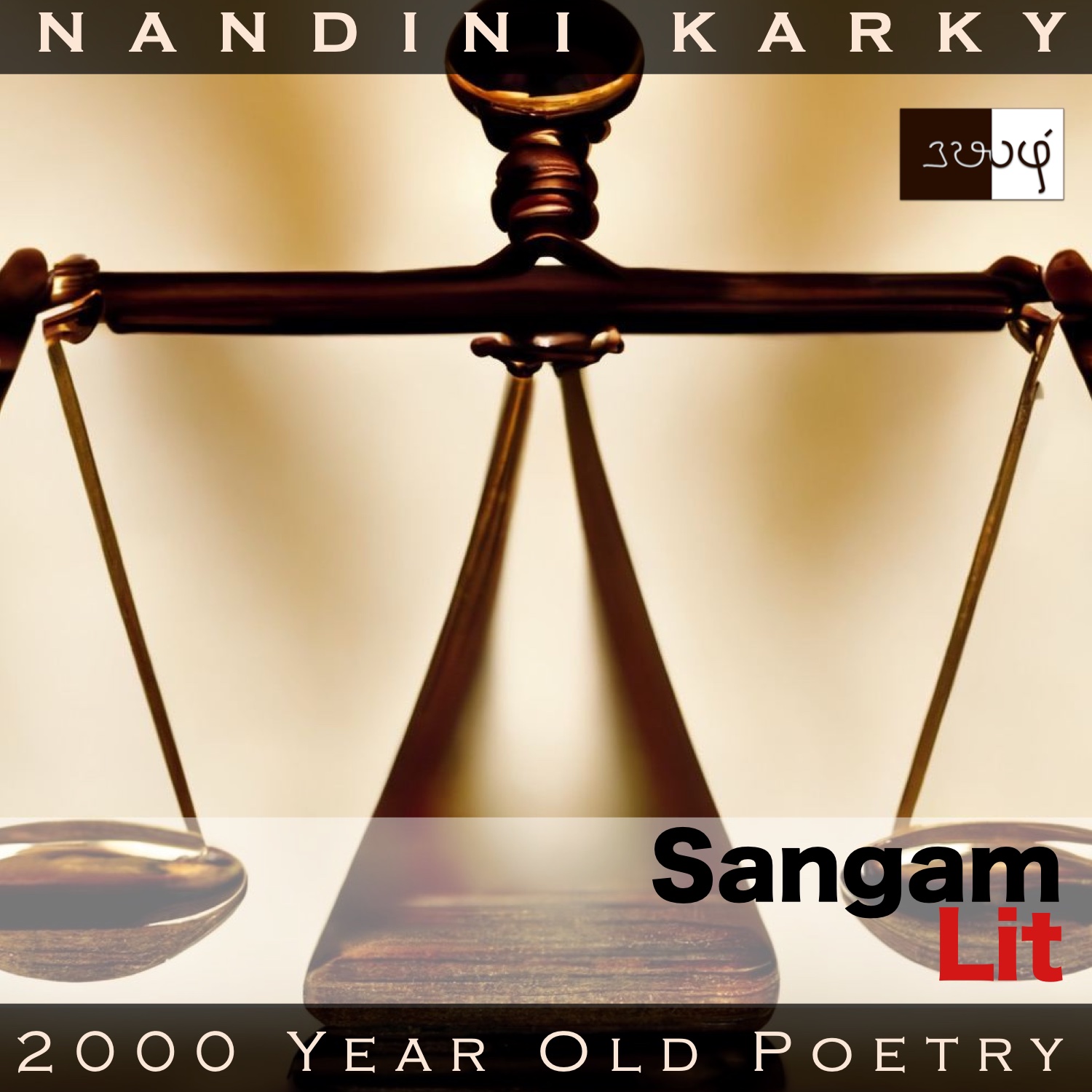Podcast: Play in new window | Download
Subscribe: Apple Podcasts | Spotify | Amazon Music | Android | iHeartRadio | TuneIn | RSS | More

In this episode, we perceive an indirect technique of rendering laurels unto a king, as depicted in Sangam Literary work, Puranaanooru 39, penned about the Chozha King Kulamutrathu Thunjiya Killivalavan by the poet Maarokkathu Nappasalaiyaar. Set in the category of ‘Paadaan Thinai’ or ‘king’s praise’, the verse describes the glories of this Chozha king and his ancestors.
புறவின் அல்லல் சொல்லிய, கறை அடி
யானை வால் மருப்பு எறிந்த வெண் கடைக்
கோல் நிறை துலாஅம் புக்கோன் மருக!
ஈதல் நின் புகழும் அன்றே; சார்தல்
ஒன்னார் உட்கும் துன் அருங் கடுந் திறல்
தூங்கு எயில் எறிந்த நின் ஊங்கணோர் நினைப்பின்,
அடுதல் நின் புகழும் அன்றே; கெடு இன்று,
மறம் கெழு சோழர் உறந்தை அவையத்து,
அறம் நின்று நிலையிற்று ஆகலின், அதனால்
முறைமை நின் புகழும் அன்றே; மறம் மிக்கு
எழு சமம் கடந்த எழு உறழ் திணி தோள்,
கண் ஆர் கண்ணி, கலி மான், வளவ!
யாங்கனம் மொழிகோ யானே ஓங்கிய
வரை அளந்து அறியாப் பொன் படு நெடுங் கோட்டு
இமயம் சூட்டிய ஏம விற்பொறி,
மாண் வினை நெடுந் தேர், வானவன் தொலைய,
வாடா வஞ்சி வாட்டும் நின்
பீடு கெழு நோன் தாள் பாடுங்காலே?
Once again, this poet celebrates the Chozha king Killivalavan referencing his famous ancestor, Sibi! The poet’s words can be translated as follows:
“You are a king, who comes from the lineage of the great one, who entered a scale fitted with a ruler, made from the white tusk of a thick-footed elephant! So, generosity will not render fame unto you!
Even a formidable hanging fortress that enemies feared to approach, was attacked and claimed by your ancestors. When we consider that, an attack will not render fame unto you!
In the court of ‘Uranthai’ of the valorous Chozhas, flawless justice has been reinstated long ago. And so, righteousness too will not render fame unto you!
O lord, who vanquishes those who had risen up against you, with striking courage, wearing alluring garlands, atop a proud horse, how am I to sing of your great actions that makes unfading ‘Vanji’ fade and ruins that king with well-etched, tall chariots, the one who has planted his flag with the bow symbol in those unmeasured, soaring, gold-tipped peaks of the Himalayas!”
Time to delve deeper into these words about the Chozha king! The poet starts by talking about the act of Sibi, the king who gave away flesh from his own body equal to the weight of a dove so that an eagle will leave it alone. An ancient story that might have had a simple and realistic core, possibly enhanced and exaggerated over the generations. The interesting detail the poet renders here is the description of the weighing scale and the material its ruler was made of, relating that it was from the tusk of an elephant. Do note this interesting detail and we will delve into it shortly. Returning, we find the poet narrating about how the king placed a part of himself to end the anguish of a dove. The reason he says this is that being compassionate and generous is not going to render any further fame to the Chozha king, Killivalavan, because the king comes in the lineage of that king, who offered such a noble sacrifice.
Next, the poet talks about how the king’s ancestors dared to attack an unassailable fort and won victory over it, and how such attacks too are not going to bring this king any fame! Turning to how justice has been established for long in the ‘Uranthai’ court of the Chozhas, the poet adds that being righteous also will not help the king attain fame. Talk about being born in the shadow of greatness! After relating about the seeming misfortune of the king to be born in this incredibly famous line of ancestors, the poet turns to the radiant appearance of the king on a battle horse, wearing a glowing garland. He then laments asking how else is he to celebrate the great victory of this Chozha king, who has destroyed the capital of the ruler, who is said to have planted his flag, bearing a bow, on the peaks of the Himalayas!
To explain what that last line means, we need to know that the flag bearing the bow symbol, belonged to the Cheras, who ruled over the eastern portion of the ancient Tamil land. And, this statement seems to refer to the Chera king ‘Imayavaramban’, translated as ‘the one whose borders extend to the Himalayas’. Sounds like a hyperbole to render glory unto this Chera king. By turning the focus on the enemy’s greatness and the Chozha king’s victory over such a king, the poet elevates that Chozha king. The unique technique of celebrating the king the poet employs here is as he is handing bouquet after bouquet of praise to the king, he seems to be wondering how to present a bouquet of praise! In other words, even as he glorifies the compassion, courage and justice of the Chozha king, he asks how is he do the same?
From these intricate strategies of poets to praise their patrons, we can turn our attention to the detail about the scale in the story of King Sibi and the dove. The poet mentions how that white, well-etched ruler is made from the tusk of an elephant. On searching about such objects, I found mentions of ivory rulers and weighing scales yet again from Indus Valley excavations at Mohenjodaro. It never fails to amaze me to see tangible objects from that distant past, from what is said to be another culture, amidst the words of these Sangam poems. Hopefully science will say with conviction one day if these are a mere coincidence or an evidence of continuity!




Share your thoughts...